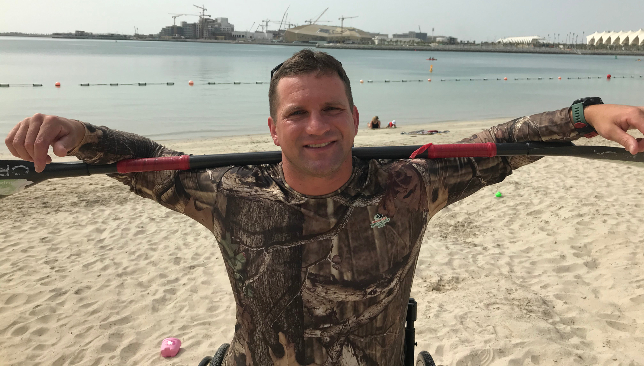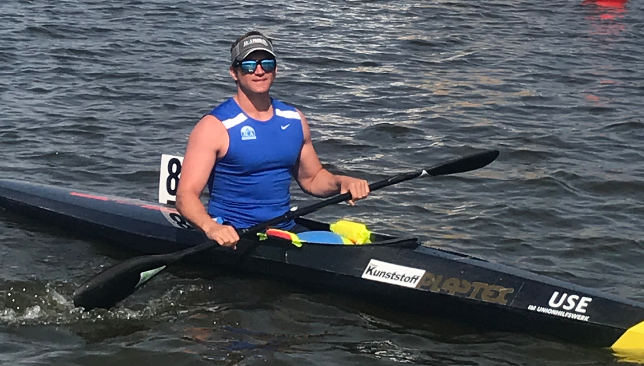
It is nearly six years since Mike Ballard went in for a tackle in the West Asia Cup final and found himself at the bottom of a pile, breaking his back under the pressure of the bodies on top of him.
The prognosis from the doctors was bleak, his T12/L1 vertebrae fractured, leaving him paralysed from the waist down. It was an accident that would change the course of his life.
When he was healthy enough, he moved back to his hometown of Michigan in the USA and began rehabilitation. A long road lay ahead.
Midway through 2016, he returned to Abu Dhabi. Back to work and back to business. He is wheelchair bound now but is self-sufficient and independent.
Working as a special needs assistant at New England Centre for children, Ballard is now preparing to compete for Team USA at this year’s Paralympic Games in Tokyo.
The 35-year-old is aiming to use the world championships in June – an Olympic qualifier – to strengthen his prospects of making Team USA for the 200 meter flare water sprint kayaking event.
As it stands, he is top of his division in America after placing 13th at the World Cup in Poland last year.
“If things go well, I will go to the world championships and qualify for Tokyo. I’ve got three months to get fit. The fires are fully lit right now and we are training hard. I try to get a morning and evening session,” he said.
“I’m a bit away from where I need to be in order to compete internationally, but I’m in a very good place. I can sit back and be happy with where I’m at right now, but at the same time, there’s a ton of work to do.”
The love of the water stemmed from his upbringing in Michigan. He would spend hours daily with his friends on the water, swimming and kayaking to fill the time.
When he first moved to the UAE nine years ago, it was an opportunity he could not pass. America would always be home, but the chance to work abroad proved to be a significant attraction.
A new life began. He balanced his busy work life with playing rugby at Abu Dhabi Harlequins and working as a kayaking tour guide with Noukhada Adventure Company.

“I grew up on the water. In my hometown there was nothing to do so we would literally float down the river every day. I’ve spent a significant amount of time on the water,” he recalls.
“From 2011-2014 I was a kayaking tour guide in Abu Dhabi and I’d do that one day a week. Usually I’d play rugby on a Friday and do the tour guide job on a Saturday. It was my Saturday routine. I loved it.”
The passion never left him. The water always drew him. Even after his injury, he made the big decision in August 2017 to really challenge for a place in the Paralympics.
He knew he would be 35 at the next Games, and it was the right time to make it happen. He was ready.
Even balancing a demanding job, he trained six days a week, sometimes even two sessions per day. Keeping consistent and retaining the enjoyment factor to his training.
US Weightlifting had initially expressed an interest in him, asking him to come to Colorado Springs for training. He weighed it up. It was enticing. However, the kayaking was healthier and a more enjoyable option.
“I initially thought what sports would I be competitive at? It came down to swimming, kayaking, field events or weight lifting,” he said.
“I had a look and said, based on my injury, these are the sports I’d be competitive at. I could probably be competitive at powerlifting, but at the same time, do I want to spend a four-year cycle in a gym and come out looking like a lumberjack?
“With kayaking, I’m in the sun on the beach every day and I come out fit and toned, as opposed to a lumberjack.
“Lifestyle wise, kayaking was a healthier option. It’s low impact on the body, healthier and social. For example, this morning, I did a 15-minute warm up, 45-minute swim and spent 45-minutes chatting with the lads. It was brilliant.”
He made the right decision. You can tell by the tone of his voice, the way he talks about his training and daily routine. He looks in prime physical shape too. However, he’s quick to note, he’s a bit off where he needs to be.
His plans are not limited to Tokyo either and if he does not secure qualification for this summer’s Games, then the chief goal is Paris in 2024. Here, he will have a more consistent stretch of training under his belt and be in career-best shape.
Generally, shoulders – central to kayaking – have a decade of competitive paddling in them and, for Ballard, his muscles have zero wear and tear. This acts hugely in his favour with Paris lying ahead. He will be 39 then, and in peak condition.
“Being in an Olympic cycle, the goal is Paris 2024 and that’s four years from now. It really doesn’t matter what I’m doing on one particular day for my training,” he said.
“For me, it is all about consecutively training over a longer period and consistently building to be competitive at the events that I need to be competitive at. You’re looking at three-four international competitions a year, peaking for one of those four every year and peaking in time for Paris.
“It’s exciting to see how healthy and fit and strong I can get. Once I’m able to stick to the plan is the main thing. It’s a big mountain to climb though.”
His name is attributed to a foundation – Mike Ballard Foundation – that has helped people across the world.
In 2016, the organisation delivered wheelchairs to medical facilities in Madagascar, as well as putting on rugby coaching clinics and supplying boots, kit and equipment to junior teams and players. A resupply mission is to be launched to the east African island next summer.
Through this journey, there have been plenty of lessons both from a mental and physical perspective. Some days have been long and reflective, however the bulk of them have been filled with promise and happiness.
No matter what sport one is involved with, experience is key and it takes time to realise what works for the body and mind, and what doesn’t.
For Ballard, some months of overtraining forced him to stop and question whether he would continue to try and achieve his Olympic dream or not.
After a brief time pondering his ambitions over the summer, he has learned to manage his training better and is hungrier to attain his future Olympic dream.
“I’m in a good place now. I’ve got a well-rounded perspective where I’m at and where I need to be. That only comes from pushing yourself until you hit that wall,” he said.
“I’ve been there to that point where I’ve overtrained. Once I’ve gotten to the point, I said to myself ‘ok what can we do to make it work going forward.’
“Over the summer of 2019, I went through a time of where I wasn’t going to do it anymore. I wasn’t ready to fully commit to a four-year programme. I took some time off.
“With taking time off, my numbers in the gym were still the same and it’s the best thing I’ve done. It’s recharged everything. I feel refocused.”